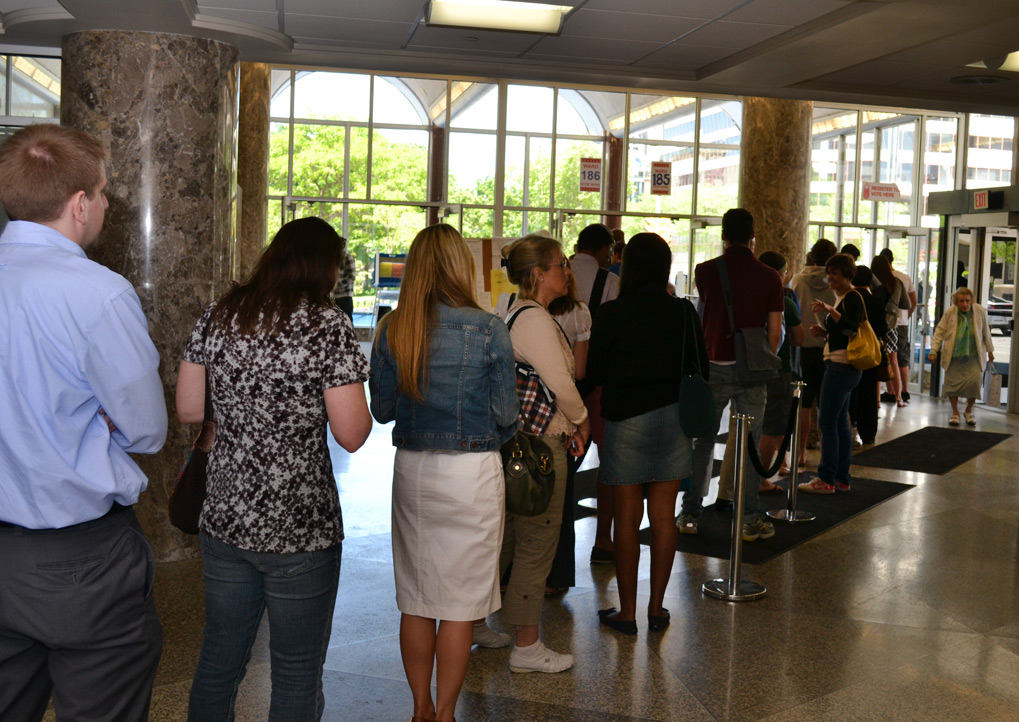Polling Lists Could Go Digital
Elections commission to replace paper lists with “e-poll books.”
The Wisconsin Elections Commission (WEC) will be asked tomorrow whether its staff should develop a plan that would let local election clerks replace printed poll lists of voters with electronic poll books – called “e-poll books” – used in 27 other states.
If e-poll books were used statewide, voters in November 2018 elections for U.S. Senate, governor, Congress and the Legislature could be confronted by poll workers carrying tablets or using laptop computers to confirm voters’ identities and have them sign their names electronically.
“E-poll books can make both the voter experience and election officials work more efficient,” commission staff members said in a memo to commissioners that recommends taking the next development step.
E-poll books could help trained poll workers look up and provide answers to voters’ most common questions, help first-time voters register and scan photo IDs. They would be used at voter check-in stations, said Michael Haas, interim Elections Commission administrator.
And don’t worry that e-poll books would make it easier for hackers from Russia or anywhere else to tamper with vote totals, Hass added. “Voting equipment in Wisconsin is not connected to the Internet,” he said.
Andrea Kaminski, executive director of the League of Women Voters, which closely follows election-law changes, said she hopes Haas is right.
Asked why the League favors the use of e-poll books, Kaminski said:
“At a time when Americans use computers for so many activities, it only makes sense to adopt current technology to make voter registration more accessible and accurate and polling place administration more efficient. Electronic poll books offer many advantages.”
In 2014, state election administers told staff members to not pursue e-books in Wisconsin. But the idea is back, WEC staff members said, “In response to the continuing request of local election officials” – some of the 1,850 local clerks in charge of the state’s 2,800 polling places.
Haas said WEC staff members recommend that they be allowed to develop e-poll books software, which would be available as local clerks decide whether to stay with the current system of printed lists of voters or buy tablets or laptop computers that would use WEC’s software.
WEC staff members estimated that having them develop software for local e-poll books would cost the agency about $125,000 – money that could be found within the agency’s budget, Haas said.
It could cost a lot more if WEC hired a private company to develop the software, Haas said. Private companies offer software systems with “bells and whistles” that aren’t needed in Wisconsin, he added.
Local officials would decide whether to rely on the state software or hire private companies to help them buy and implement e-poll books and decide how many e-poll books to buy. If Kenosha County bought 100 e-poll books, for example, its annual costs would range from $11,500 to $15,149, WEC officials estimated.
Haas said e-poll books could be in place in “early adapting” counties for November 2018 elections. Pilot projects with e-poll books could be used in the April general election and August primary election, he added.
A Wisconsin town with only 300 voters would not be likely to use e-poll books, Haas said.
WEC staff members asked Iowa, Michigan and Colorado officials how e-poll books have worked in their states. Iowa, where 74 of the state’s 99 counties use e-poll books, reported development costs of about $190,000. About 4,200 of Michigan’s 4,800 precincts use e-poll books and state officials reported development costs of between $60,000 and $75,000. Colorado mails ballots to all voters, requires the use of Interest based e-poll books at every voting station and reported development costs of about $432,000.
Although Iowa officials said local poll workers were “anxious” about converting from poll lists to e-poll books, careful training overcame that reaction. Between 25,000 and 30,000 officials and volunteers work on a presidential election in Wisconsin.
WEC staffers said Iowa Michigan and Colorado officials all agreed on one thing: “None regretted their [e-poll books] decision.”
Steven Walters is a senior producer for the nonprofit public affairs channel WisconsinEye. Contact him at stevenscwalters@gmail.com
The State of Politics
-
A Wisconsin Political Trivia Quiz
 Dec 15th, 2025 by Steven Walters
Dec 15th, 2025 by Steven Walters
-
The Fight Over Wisconsin’s House Districts
 Dec 8th, 2025 by Steven Walters
Dec 8th, 2025 by Steven Walters
-
The Battle Over On-Line Betting
 Nov 24th, 2025 by Steven Walters
Nov 24th, 2025 by Steven Walters






















Sorry…but I call baloney on this one. Just because they think no one can tamper with vote totals doesn’t mean they can’t tamper with the poll books or other data once it is ‘out there’. And a computer on the network doesn’t actually have to have a port to the internet in order to be hacked once a hacker gains access to the network it resides on.
And don’t worry that e-poll books would make it easier for hackers from Russia or anywhere else to tamper with vote totals, Hass added. “Voting equipment in Wisconsin is not connected to the Internet,” he said.
more expensive technology only to slow down the voting system, make access to voting harder, and not provide any real benefit. It wasn’t broken before, please let’s not break it any further. The creation of voter ID is a big enough hoax.